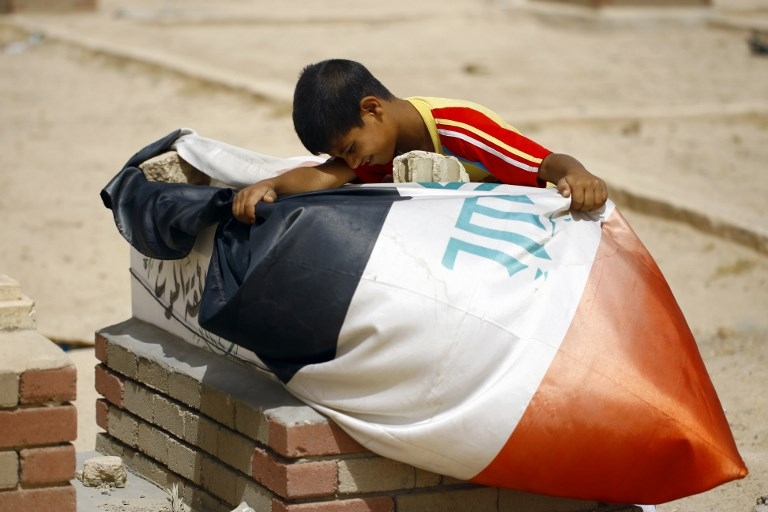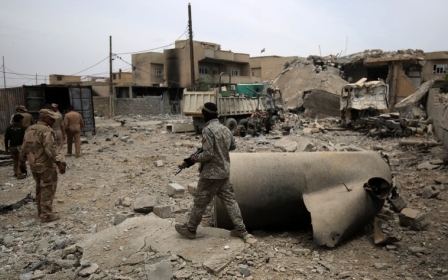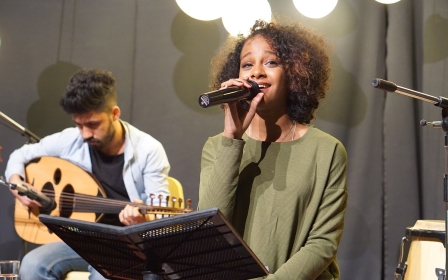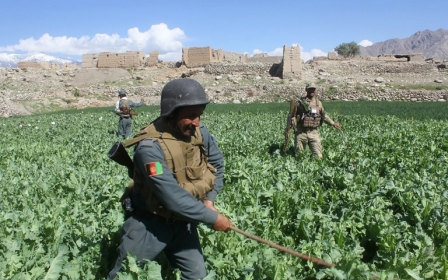Bush, Obama and Trump have discovered the secret of perpetual motion: It's called the war on terror

With the remnants of the Islamic State (IS) group on the verge of fleeing Mosul and Raqqa for the remote corners of the desert and who the hell knows else where, political leaders around the world will predictably hail the three-year campaign against the insurgent group as a military victory.
The only thing one might accurately conclude from the “War on Terror” is the jihadist-insurgent threat is greater today than it was the day the Bush administration began bombing the mountains of Afghanistan
Who knows, Donald Trump may even hold a ticker tape parade in New York City for the thousands of US “military advisors” involved in combat operations against the self-declared Islamic State.
But military success against IS means less than zero. The defeat of IS will change nothing. In fact, the only thing one might accurately conclude from a “War on Terror” that has lasted for 15 years is that the jihadist-insurgent threat is greater today than it was the day the Bush administration began bombing the mountains of Afghanistan.
While IS will soon no longer hold territory, al-Qaeda affiliates, which have embedded themselves in localised conflicts and civil wars, are stronger and greater in manpower than at any other time in the terror group’s existence, and the ongoing bloodshed and chaos in Syria, Libya, Yemen, and Afghanistan will continue to provide a pool of recruits these affiliates need to survive and thrive.
No memories of Saddam
Iraq, however, provides the best glimpse into the next phase of this never-ending cycle of violence and counter-violence.
Not only did the US invasion and occupation of Iraq give birth to both al-Qaeda in Iraq and IS, it is also Iraq that illustrates the futility of pursuing a military strategy against the jihadist-insurgent threat without a political and economic strategy to underpin it.
'Excuses, finger-pointing and the war against terrorism will no longer be enough justification for young Iraqis who struggle to understand why they still do not have jobs, paved roads, electricity or other basic services and rights'
- Hayder al-Khoei, Iraqi analyst
And it is Iraq that best illustrates the socio-economic-political conditions that make both Sunni-jihadist groups and Shia militias irresistible for so many of today’s listless Arab youth.
Described as “Generation 2000”, 15 to 24 year-olds now represent roughly 20 percent of Iraq’s total population. This age group grew up in the aftermath of the 2003 US invasion, lived through the hyper-sectarian violence of the 2006-07 civil war, the failed policies of Nouri al-Maliki's government, and the rise of IS.
As this age group comes of employment age, it finds a country paralysed by corrupt party-patronage networks, high unemployment, deteriorating infrastructure and civil services, and a land carved up by both Shia and Sunni militia groups. While public sector jobs offer the best future, they are not only few and far between, but are also reserved for the families that patronise Iraq’s political elites.
"It means it will be increasingly vocal and active in its demands for reform. Excuses, finger-pointing and the war against terrorism will no longer be enough justification for young Iraqis, who struggle to understand why they still do not have jobs, paved roads, electricity or other basic services and rights.”
Scaling the walls
Exactly 12 months ago, protesters scaled the walls of Baghdad’s Green Zone, the nerve centre of the country’s political institutions, to demand economic reforms, jobs, and an end to the violence that had besieged the country since IS captured Mosul two-years earlier.
Significantly, the protesters were led by Shia cleric Moqtada al-Sadr. The protests abated only when Prime Minister Haider al-Abadi declared a new offensive against IS in Fallujah. “Young men recruited into Shia militias fought an enemy there drawn from the same pool of Iraq’s young, but Sunni,” the International Crisis Group (ICG) observed.
“Fifteen fighters entered the city. During Friday prayers, they announced they had come to end government injustices and terminate amnesty police and soldiers entering the city. Young boys took to the street cheering victory. The jihadists recruited a number of these who had no connection to the insurgency and no affiliation with political parties, but were supporters of the [anti-government] protests. They tasked with them ensuring protection of public and private property, without asking them to swear allegiance. Only after weeks of testing their potential were the youths asked to pledge allegiance to Daesh (IS).”
What hope?
Three forces are converging on Iraqi youth: the slump in oil prices, which deprive the state of the funds it needs to provide social services and welfare; the existential need to maintain and feed a patron-party political system within a government ranked in the top 10 most corrupt in the world; and a demographic youth bulge that presents a stark choice between violence and migration.
If a future isn’t found for this current young generation, the next phase of the conflict in the Levant promises to be more bloody and protracted than many dare imagine
If a future isn’t found for this current young generation, the next phase of the conflict in the Levant promises to be more bloody and protracted than many dare imagine. In other words, the end of this conflict lies far beyond the application of military force.
In a recent survey of Arab attitudes in the Middle East, young Arabs view education reform and employment opportunities as equally important as military action in the fight against the Islamic State, while also identifying the need for a mass media campaign that exposes the way in which IS distorts Islamic scripture to shape its propaganda.
“The crisis in Iraq is poised to worsen as the battles against the Islamic State continue in heavily-populated sections of western Mosul, and as the government fails to manage resources and curb corruption,” said Hassan Hassan, co-author of ISIS: Inside the Army of Terror.
“The optimism about the military action against the Islamic State in Iraq is eclipsed by the pessimism that Iraqis expressed towards their government and its ability to provide jobs and better education after the Islamic State is defeated.”
'Band-aid on a gushing wound'
With Iran recruiting disaffected young Shia Iraqis to join Iranian-backed militias in Syria, the International Crisis Group warns Iraq’s “Generation 2000” could become a “transnational challenge,” and thus advises the following non-military policy prescription for resolving the conflict: “A youth policy grounded in the notion young Iraqis need avenues for political participation and social advancement outside the parties’ discredited co-option by patronage”; a greater investment in the military to boost the national army with the twin goals of creating jobs and starving the militias of new recruits; an effort to “civilianise” sectarian militias into neighbourhood patrols that are coordinated by provincial authority; and a focus on increasing state legitimacy by investing national resources into areas freed from IS.
“The biggest challenge that Iraqis will face after the imminent defeat of ISIS is corruption and how to tackle it,” Hayder al-Khoei told me. “Until this issue is addressed, which is a plague that affects every level of local and national politics, everything else that is done will be like putting a band-aid on a gushing wound.”
Clearly, the United States has a moral responsibility here, too. It has relied exclusively on the use of military force to defeat IS. It must now seek avenues where it can provide economic and civil aid towards a national stabilisation project. "Butter" must be added to its ‘bombs away” approach.
- CJ Werleman is the author of Crucifying America, God Hates You. Hate Him Back, Koran Curious, and is the host of Foreign Object. Follow him on twitter: @cjwerleman
The views expressed in this article belong to the author and do not necessarily reflect the editorial policy of Middle East Eye.
Photo: An Iraqi youth mourns over the coffin of a relative wrapped in the national flag on 14 July 2014 at one of the world's biggest cemeteries in the holy Shia city of Najaf (AFP)
New MEE newsletter: Jerusalem Dispatch
Sign up to get the latest insights and analysis on Israel-Palestine, alongside Turkey Unpacked and other MEE newsletters
Middle East Eye delivers independent and unrivalled coverage and analysis of the Middle East, North Africa and beyond. To learn more about republishing this content and the associated fees, please fill out this form. More about MEE can be found here.







